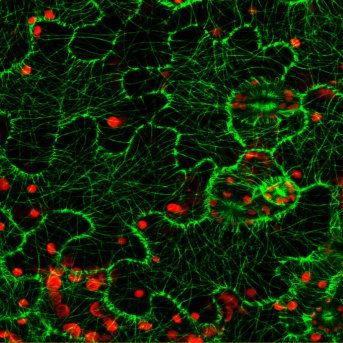DSM's research activities aim to improve understanding of plant development at different scales. Ultimately, this research should enable the development of innovative strategies to engineer plants for agriculture, the agri-food industry and non-food applications.
Biological Question
The DSM department is structured around 10 teams whose research aims to elucidate the mechanisms that control plant development at different scales (from the genome and nucleus to the cell, organ and whole plant). Cellular processes such as expansion, division, differentiation and totipotency are particularly studied. The signals involved in the control of these processes are also explored, in particular by the study of epigenetic, genetic, metabolic and hormonal regulations, as well as mechanical stresses undergone by the cells and the physicochemical state of the cellular wall. The role of these signals in various developmental contexts and/or under environmental constraints (abiotic and biotic stresses, plant-plant interactions) are studied. We are also developing innovative strategies for statistical analysis and numerical modelling, particularly from image data, to analyze some of these complex mechanisms.
Models, tools and methods
Different model species are used to answer our scientific questions, including Arabidopsis thaliana, Brachypodium distachyon, Amaranthus, Capsella rubella, Camelina sativa, Solanum lycopersicum, Physcomitrium patens and Pisum sativum.
We use classical approaches of genetics and functional genomics, supplemented by biochemistry, glycochemistry, analytical chemistry and cytology. Multi-dimensional fluorescence microscopy (in particular confocal microscopy in 2D, 3D, and time-lapse) is extensively used in our department. Multiple « Omics » approaches such as methylomics, oligoglycomics, RNA-seq and spatial transcriptomics, CHIP-seq, INTACT, and single cell methods are among the strategies that are also used in the department. We also develop or integrate in our research original approaches for the experimental acquisition of data (super-resolution microscopy, microfluidics, smart microscopy, new labelling tools), data analysis (automated image analysis, statistical methods for data integration, deep learning), up to computational modelling (gene networks, finite element models, image-based modelling).
Societal and economical impacts
Our research should provide the bases of innovative strategies for plant engineering aimed at optimizing plant functions of interest in agriculture and other domains (nutrition, materials, pharmaceuticals, ecosystem services, etc.). Possible outputs include improvement of plants for agriculture and food industry in the frame of the ecological transition, modulation of plant architecture, improvement of regeneration and transformation techniques, and biomass applications for energy, chemistry and materials.
The DSM department is structured around 10 teams whose research aims to elucidate the mechanisms that control plant development at different scales (from the genome and nucleus to the cell, organ and whole plant). Cellular processes such as expansion, division, differentiation and totipotency are particularly studied. The signals involved in the control of these processes are also explored, in particular by the study of epigenetic, genetic, metabolic and hormonal regulations, as well as mechanical stresses undergone by the cells and the physicochemical state of the cellular wall. The role of these signals in various developmental contexts and/or under environmental constraints (abiotic and biotic stresses, plant-plant interactions) are studied. We are also developing innovative strategies for statistical analysis and numerical modelling, particularly from image data, to analyze some of these complex mechanisms.
Models, tools and methods
Different model species are used to answer our scientific questions, including Arabidopsis thaliana, Brachypodium distachyon, Amaranthus, Capsella rubella, Camelina sativa, Solanum lycopersicum, Physcomitrium patens and Pisum sativum.
We use classical approaches of genetics and functional genomics, supplemented by biochemistry, glycochemistry, analytical chemistry and cytology. Multi-dimensional fluorescence microscopy (in particular confocal microscopy in 2D, 3D, and time-lapse) is extensively used in our department. Multiple « Omics » approaches such as methylomics, oligoglycomics, RNA-seq and spatial transcriptomics, CHIP-seq, INTACT, and single cell methods are among the strategies that are also used in the department. We also develop or integrate in our research original approaches for the experimental acquisition of data (super-resolution microscopy, microfluidics, smart microscopy, new labelling tools), data analysis (automated image analysis, statistical methods for data integration, deep learning), up to computational modelling (gene networks, finite element models, image-based modelling).
Societal and economical impacts
Our research should provide the bases of innovative strategies for plant engineering aimed at optimizing plant functions of interest in agriculture and other domains (nutrition, materials, pharmaceuticals, ecosystem services, etc.). Possible outputs include improvement of plants for agriculture and food industry in the frame of the ecological transition, modulation of plant architecture, improvement of regeneration and transformation techniques, and biomass applications for energy, chemistry and materials.

Department heads:
Nicolas Arnaud
Philippe Andrey
Nicolas Arnaud
Philippe Andrey